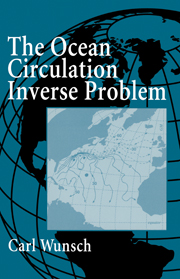Summary
Physical oceanography is a branch of fluid dynamics and is a part of classical physics. As such, the oceanographer's job is to produce quantitative descriptions and explanations of the behavior of the fluid ocean. The movement of oceanic water has consequences for a bewildering variety of applicationsclimate change; biological productivity; sealevel change; weather forecasting; fisheries prosperity; the chemical history of the earth; the dynamics of the earth-moon system; the movement of pollutants; and so forth. Understanding of the fluid circulation and the properties it carries is of great and growing importance.
Fluid flows are diverse and often very complicated. For this reason, most understanding of particular situations has resulted from an intimate partnership of theory with observation and with laboratory experimentation. But as compared to fluid dynamics as practiced in its innumerable applications-meteorology, aerodynamics, hydraulics, heat transfer, etc.-the problem of observing the ocean is particularly difficult, rivaled perhaps only by the observational problems of inferring the fluid properties of the earth's interior, or of other planets and of stellar interiors. The ocean is very large, turbulent, and inaccessible to electromagnetic radiation. Armed mainly with slow-moving, expensive ships, and instruments which have to work in a corrosive, high-pressure environment, oceanographers have over the years built up in somewhat painful fashion a picture of how the ocean operates. But the picture is known to be badly distorted by the very limited observational base, leading for example, to the need to assume that the large-scale fluid flow is steady with time, so that measurements obtained over many years could be combined in the inferential process. Much of the description available is only qualitative.
- Type
- Chapter
- Information
- The Ocean Circulation Inverse Problem , pp. ix - xiiPublisher: Cambridge University PressPrint publication year: 1996



